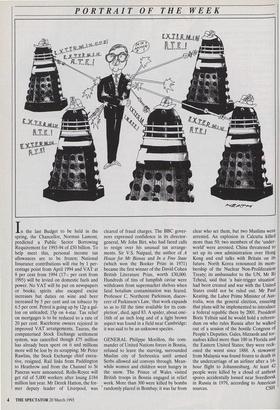PORTRAIT OF THE WEEK
In the last Budget to be held in the spring, the Chancellor, Norman Lamont, predicted a Public Sector Borrowing Requirement for 1993-94 of £50 billion. To help meet this, personal income tax allowances are to be frozen; National Insurance contributions will rise by 1 per- centage point from April 1994 and VAT at 8 per cent from 1994 (171a per cent from 1995) will be levied on domestic fuels and power. No VAT will be put on newspapers or books; spirits also escaped excise increases but duties on wine and beer increased by 5 per cent and on tobacco by 6.5 per cent. Petrol is going up by 12p a gal- lon on unleaded; 15p on 4-star. Tax relief on mortgages is to be reduced to a rate of 20 per cent. Racehorse owners rejoiced in improved VAT arrangements. Taurus, the computerised Stock Exchange settlement system, was cancelled though £75 million has already been spent on it and millions more will be lost by its scrapping; Mr Peter Rawlins, the Stock Exchange chief execu- tive, resigned. Rail links from Paddington to Heathrow and from the Channel to St Pancras were announced. Rolls-Royce will get rid of 5,000 workers after losing £184 million last year. Mr Derek Hatton, the for- mer deputy leader of Liverpool, was
cleared of fraud charges. The BBC gover- nors expressed confidence in its director- general, Mr John Birt, who had faced calls to resign over his unusual tax arrange- ments. Sir V.S. Naipaul, the author of A House for Mr Biswas and In a Free State (which won the Booker Prize in 1971) became the first winner of the David Cohen British Literature Prize, worth £30,000. Hundreds of tins of lumpfish caviar were withdrawn from supermarket shelves when fatal botulism contamination was feared. Professor C. Northcote Parkinson, discov- erer of Parkinson's Law, 'that work expands so as to fill the time available for its com- pletion', died, aged 83. A spider, about one- 16th of an inch long and of a light brown aspect was found in a field near Cambridge; it was said to be an unknown species.
GENERAL Philippe Morillon, the com- mander of United Nations forces in Bosnia, refused to leave the starving, surrounded Muslim city of Srebrenica until armed Serbs allowed aid convoys through. Mean- while women and children went hungry in the snow. The Prince of Wales visited British troops in Bosnia engaged in relief work. More than 300 were killed by bombs randomly placed in Bombay; it was far from
clear who set them, but two Muslims were arrested. An explosion in Calcutta killed more than 50; two members of the 'under- world' were arrested. China threatened to set up its own administration over Hong Kong and end talks with Britain on its future. North Korea renounced its mem- bership of the Nuclear Non-Proliferation Treaty; its ambassador to the UN, Mr RI Tcheul, said that 'a hair-trigger situation' had been created and war with the United States could not be ruled out. Mr Paul Keating, the Labor Prime Minister of Aus- tralia, won the general election, ensuring that plans will be implemented to introduce a federal republic there by 2001. President Boris Yeltsin said he would hold a referen- dum on who rules Russia after he walked out of a session of the hostile Congress of People's Deputies. Gales, blizzards and tor- nadoes killed more than 100 in Florida and the Eastern United States; they were reck- oned the worst since 1888. A stowaway from Malaysia was found frozen to death in the undercarriage of an airliner after a 14- hour flight to Johannesburg. At least 42 people were killed by a cloud of anthrax spores accidentally loosed near Sverdlovsk in Russia in 1979, according to American


























































 Previous page
Previous page